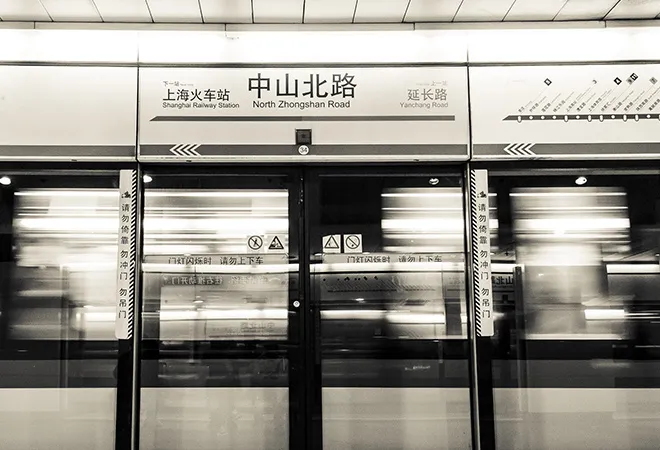 This is the first part in a new series —
This is the first part in a new series — Russian Dossiers
— examining Russia and Russian engagements with the world.
The SCO Summit took place in Astana in the second week of this month. India and Pakistan are the first new members to join the organisation in its 16-year history. Russian President Vladimir Putin admitted that integrating the two conflicting countries in the SCO is not going to be an "easy task", but said he hoped that broad basing the organisation will be more effective in countering challenges to regional security. He described the deteriorating situation in Afghanistan as the most serious of these threats.
As
Kommersant had reported earlier, with the joining of these two countries, the SCO's agenda is going to face significant change and framing a consensus will become much more complicated. Apart from conflicting views of the new members, India also has a dispute with a founding member state of the SCO (China).
Russian President Putin claimed on 9 June 2017 that the SCO enlargement will "undoubtedly lead to increasing its power and influence in political, economic and humanitarian fields." He said that India and Pakistan have completed all the procedures and signed more than 30 SCO agreements. "At this point it is essential for us to help our new colleagues to quickly and effectively get involved into the Organisation's activities and all its departments and structures. This is not an easy task and all of us will have to watch carefully how it all is going to be executed in practice" — said Mr. Putin. He also hinted that Russia is ready to consider new candidates for the SCO. The day before, the President's assistant, Mr. Yuri Ushakov, told
Kommersant that Moscow is interested in continuing the SCO's expansion — primarily by making Iran a member.
Moscow hopes that expanding the organisation will help in fighting regional threats more effectively, with the situation in Afghanistan being the most serious of these.
"USA and NATO have been conducting military operations against Taliban for 15 years. However, the political situation in the country keeps degrading," he said. He noted that the USA was asking their allies in NATO, primarily Europeans, to renew their active participation in Afghanistan.
"Apparently not all NATO member states, including Europeans, want to be involved in this issue. Almost no one wants to fully return there
," said President Putin. He suggested renewing the initiative of the contact group "SCO — Afghanistan" which paused its activities in 2009 and expressed the opinion that the SCO could help in managing the dialogue between the Kabul government and opposition groups.
During the Summit in Astana, 11 documents were signed. Among them were: the Astana declaration; the SCO convention on countering extremism; the statement on joint action against international terrorism; the plan for a joint tourism programme for 2017-2018; mutual understanding memorandum between the SCO secretariat and the International Red Cross Committee.
In the meantime, as Kommersant has stated before, next year, when India and Pakistan gain the voting right, it will become harder to agree on final documents. For example, the Astana declaration signed on Friday says that SCO member-states "consistently stand for full implementation of the provisions of the Nuclear Non-Proliferation Treaty (NPT), full and balanced advancement of all its goals and principles, enhancing the role, efficiency, and universal nature of the agreement, developing the process of nuclear disarmament and strengthening of the global non-proliferation regime." However, India and Pakistan are nuclear powers who have not signed this agreement.
Besides, the Astana declaration mentions that member-states welcomed the Chinese Belt and Road initiative and highly valued the results of the Beijing forum held on 14-15 May. Not only did India boycott the forum but also openly described this initiative as a "colonial enterprise".
However, SCO Secretary General Rashid Alimov called the acceptance of new members to the Organisation an historical event, saying the SCO "is becoming a central and linking structure in Eurasia."
China has now taken over the mantle of the SCO chair. In his speech in Astana, Chinese President Xi Jinping suggested developing an agreement for simplifying multilateral trade within the SCO.
Prior to the SCO summit meeting, the military representatives of member-states held talks. During one of these meetings, Russian Defence Minister Sergey Shoigu and his Chinese colleague, Chang Wanquan, signed the "roadmap" for military cooperation for 2017-2020. "It is important that Russia and China are ready to jointly safeguard peace and enhance international security," said Mr. Shoigu, underlining that the intensity of the Russian-Chinese military dialogue signifies that they are for a constructive dialogue about all global and regional security issues.
According to sources close to Russian Ministry of Defence, the "roadmap" describes the main parameters of cooperation and identifies approximate dates for completion of the main programmes of military and military-technical cooperation.
These sources said the “roadmap” stresses the importance of joint military manoeuvres in South China Sea and joint air defence exercises in the context of the North Korean situation and the presence of American THAAD in South Korea.
The roadmap also has some more "peaceful" points, like the exchange of delegations to study modern warfare and teaching of Chinese students in Russian military institutions.
This article originally appeared in Russian in the Kommersant Newspaper on 10 June 2017. It is republished courtesy Kommersant.
Translation by Mariia Bobyleva.
The views expressed above belong to the author(s). ORF research and analyses now available on Telegram! Click here to access our curated content — blogs, longforms and interviews.



 This is the first part in a new series — Russian Dossiers — examining Russia and Russian engagements with the world.
This is the first part in a new series — Russian Dossiers — examining Russia and Russian engagements with the world.
 PREV
PREV

